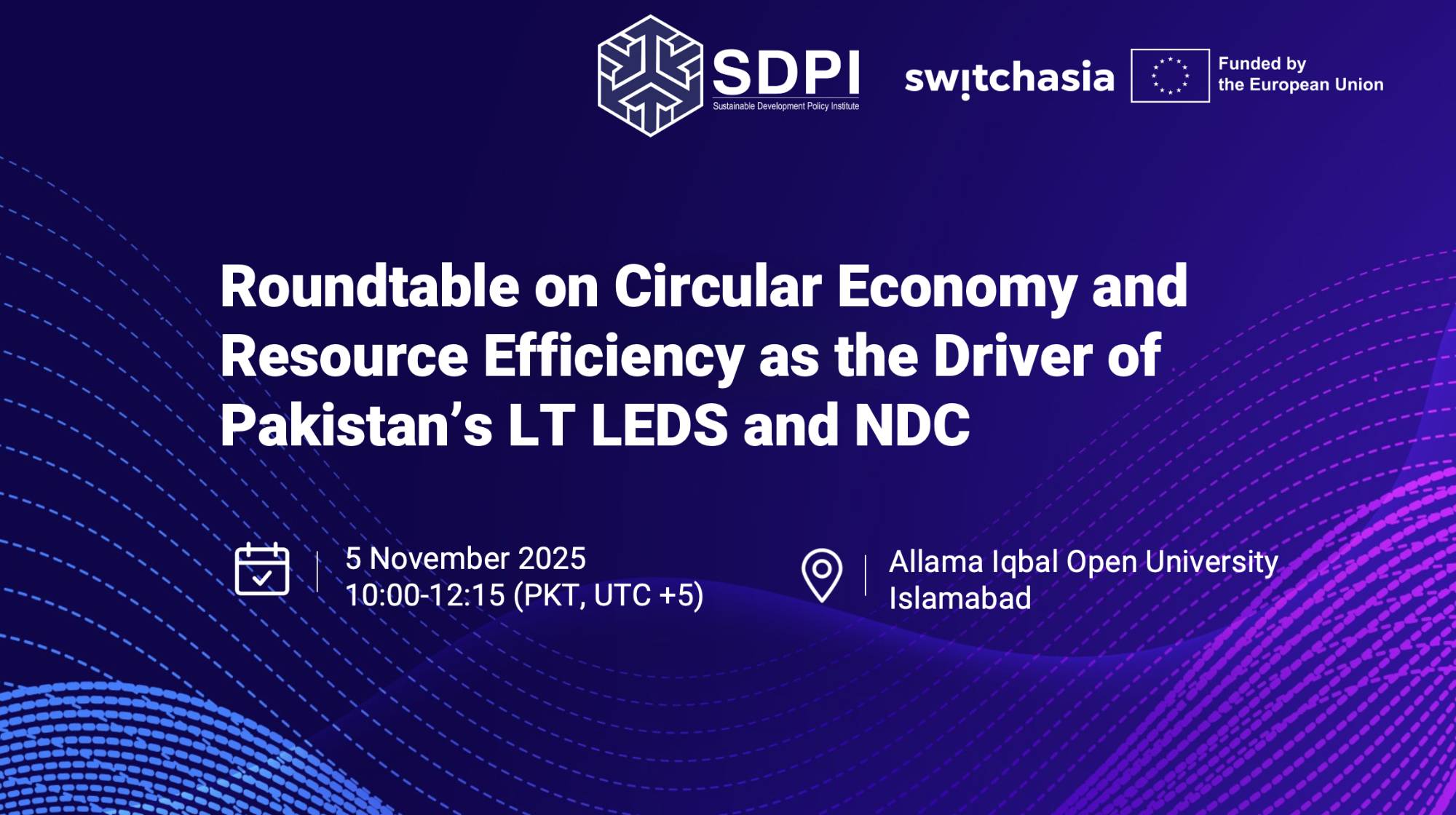
WHEN: 5 November 2025 I TIME: 10:00-12:15 (PKT, UTC +5) I This event is by invitation only
Background
Pakistan’s NDC 3.0 raises the country’s climate ambition to 2035 and broadens the mitigation lens beyond the power sector to include industry, cities, mobility, construction materials, and waste and resource management. Achieving these targets in a credible and affordable way calls for a long-term pathway that redefines how Pakistan uses its resources, not only how it generates and supplies energy. This pathway is articulated in the Long-Term Low Emission Development Strategy (LT-LEDS), whose foundation should be grounded in Circular Economy (CE) and Resource Efficiency (RE) principles.
An LT-LEDS anchored in CE and RE places emphasis on reducing material throughput, extending the lifespan of products and assets, and closing loops through the development of secondary materials markets. It promotes upstream interventions such as Extended Producer Responsibility (EPR) and Green Public Procurement (GPP), which stimulate demand for efficient, repairable, and recyclable products. At the same time, it calls for strengthening municipal systems to make them bankable—through improved waste sorting, organic waste diversion, and sanitary disposal supported by clear monitoring, reporting, and verification (MRV) mechanisms.
In Pakistan’s context, marked by high import dependence for fuels and materials, constrained fiscal space, a large base of MSMEs in industry, and rapidly expanding urban waste streams, embracing CE and RE offers multiple dividends. It can reduce overall system costs, save foreign exchange, boost industrial competitiveness, and enhance economic and environmental resilience, all while contributing to significant emissions reductions.
This round table aims to translate the intent of NDC 3.0 into shared principles and contours of an LT LEDS chapter on CE and RE without pre-judging or locking in specific interventions or pilot designs.
Roundtable Objectives
To build a shared understanding and consensus on principles, priorities, and enabling directions for embedding CE and RE within Pakistan’s LT LEDS in a way that complements NDC 3.0 and respects institutional and fiscal realities.
- Surface common principles for CE and RE in the LT LEDS, for example efficiency first loop closing, just transition, MSME inclusion, finance-ability, Article 6 readiness.
- Agree a short list of priority themes that merit deeper technical work after the meeting, for example industry efficiency and waste heat recovery, secondary materials markets, EPR for packaging, municipal systems, green procurement.
- Clarify enabling directions to guide follow on work, including standards, procurement templates, regulatory housekeeping, and data and MRV needs.
- Outline a lightweight process for next steps - who convenes, what materials are needed, and indicative checkpoints without selecting specific projects or pilots.
Agenda
|
Time |
Session |
Speakers |
|
10.00 – 10.15 |
Registration |
|
|
10.15 – 10.20 |
Welcome |
EU Delegation to Pakistan Representative |
|
10.20 – 10.30 |
Opening Remarks |
Additional Secretary, Ministry of Climate Change |
|
10.30 – 10.50 |
Keynote Address Sustainable Consumption and Production as a Climate Action Level |
Mr. Ranga Pallawala, Climate Expert, SWITCH-Asia Policy Support Component (PSC) |
|
10.50 – 11.15 |
Tea Break - Networking |
|
|
11.15 – 11.30 |
Presentation – Pakistan SCP White Paper & NDC 3.0 Insights |
Mr. Arif Rahman, Expert for SWITCH-Asia Policy Support Component |
|
11.30 – 12.00 |
Moderated Discussion SCP in NDC and LT-LEDS with Implementation Pathways |
Moderator Dr. Imran Khalid Panellists: 1. Ms. Sobiah Becker (GIZ) 2. Dr. Abid Suleri (SDPI) 3. Mr. Ranga Pallawala (EU SWITCH-Asia PSC) 4. Dr. Arif Goheer (Government of Pakistan)
|
|
12.00 – 12.15 |
Q/A Session |
|


